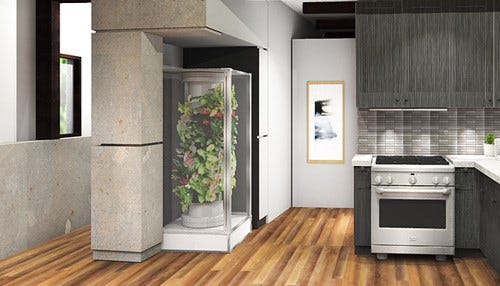Ag and Virus Detection Startups Score Wins
 The appliance requires only an electrical outlet and has a standalone water system.
The appliance requires only an electrical outlet and has a standalone water system.
Subscriber Benefit
As a subscriber you can listen to articles at work, in the car, or while you work out. Subscribe NowA handful of Purdue University undergraduate students is still months away from graduation, but already have a company backed by $35,000 in funding and a mission to enable Americans to easily grow fresh produce inside their homes. The company took top prize at the recent Schurz Innovation Challenge, which is organized by the Purdue Foundry. The second place winner is equally ambitious, looking to unleash the power of smartphones to battle disease in low-resource areas.
West Lafayette-based Hydro Grow LLC has created an appliance that grows fresh produce inside a case about the size of a refrigerator. The system utilizes hydroponics, a growing method that doesn’t use soil; instead, plants’ roots grow directly into nutrient-rich water.
“If you buy a head of lettuce at the grocery store, chances are, it was grown in California; that’s where two-thirds of our nation’s produce comes from. By the time you’re eating that produce, it’s a week old,” says Hydro Grow Chief Executive Officer and founder Scott Massey. “I thought if I could make a system that continually keeps produce alive until the moment you eat it, that could change everything.”
The Hydro Grow appliance contains a tower that the user plugs small cups into; the cups look much like the popular pods that make individual cups of coffee. Each pod grows a specified vegetable; the company’s website describes it as “a personalized farmer’s market within a home.” The system is designed to be visually appealing, requires only an electrical outlet and has a standalone water system; Massey says, “like a fish tank, you just top off the water.”
The company is initially focusing on leafy greens, such as spinach, lettuce and fresh herbs; Massey says the appliance grows the produce in three weeks, versus several months using traditional methods.
“I’m excited about the possibility of this being in every single American household. I know that’s a huge venture, but to me, it makes too much financial sense to not do it,” says Massey. “You’re not going to the grocery as much; you’re growing your own produce, so there’s a breakeven point.”
On the heels of winning $5,000 at the recent Foundry event, Hydro Grow earned $25,000 from the Purdue Ag-celerator and an additional $5,000 at the Innovator Connector’s Big Idea Pitch Competition. Buoyed by the recent successes, the startup is now building second generation models of the appliance, communicating with potential investors and preparing for more business competitions.
West Lafayette-based Viratect was the runner-up at the competition, working to commercialize a technology that, essentially, converts a smartphone to a specialized microscope to detect diseases in global low-resource areas where conventional methods are unrealistic or too costly.
The point-of-care technology is comprised of three parts: a disposable cartridge, 3D printed hardware that attaches to a smartphone and an app that translates the information to a diagnosis. In the field, a medical professional would collect a sample—such as blood from a patient or a water sample from the environment—and load it into the cartridge, or “test kit.”
“You put the test kit on the 3D-printed hardware that’s attached to a smart phone,” says Katherine Clayton, a Purdue mechanical engineering PhD student leading the startup. “You open the smartphone app, and it triggers the camera to look at that sample in the test kit. There are specialized lenses within the hardware and an algorithm that we developed to analyze those images and give you a result: that pathogen or disease is present or it’s not.”
Because the method uses a smartphone, Clayton says the results could also be geotagged.
“That geotagged data can show where hot spots are occurring, and that information can aid health organizations, local clinics or governments to help them make more informed decisions about how to treat those infected areas,” says Clayton.
The startup earned $4,000 at the competition and is now focused on improving the design for the second generation prototype. The company wants the technology to be capable of processing a wide variety of samples and is looking for partners “to help us make Viratect a reality.”
Clayton says the technology’s ability to geotag information can help track and predict disease outbreaks.
Ultimately, Massey envisions the appliance having an intelligent system that can create optimum growing conditions for each individual plant.
